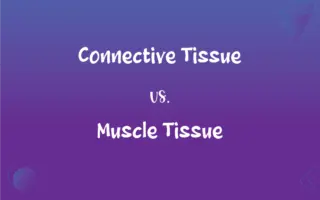Isosorbide Mononitrate vs. Isosorbide Dinitrate: What's the Difference?
Edited by Harlon Moss || By Janet White || Published on January 19, 2024
Isosorbide mononitrate is a long-acting nitrate for angina, while isosorbide dinitrate is short-acting with broader uses including heart failure.

Key Differences
Isosorbide mononitrate, primarily used for angina pectoris, is a long-acting nitrate. It offers sustained symptom relief by relaxing blood vessels. Isosorbide dinitrate, on the other hand, is a shorter-acting nitrate, effective for both angina and heart failure. It functions similarly by dilating blood vessels but requires more frequent dosing.
Isosorbide mononitrate is known for its consistent and complete oral absorption, leading to stable plasma levels. This makes it a reliable option for chronic management of angina. Isosorbide dinitrate, conversely, undergoes significant first-pass metabolism, resulting in variable bioavailability. This characteristic makes its pharmacokinetics less predictable compared to mononitrate.
The dosage regimen of isosorbide mononitrate typically involves once or twice-daily dosing due to its longer half-life. This convenience enhances patient compliance. Isosorbide dinitrate requires more frequent dosing, generally three to four times a day, to maintain its therapeutic effect, which can affect patient adherence.
Patients on isosorbide mononitrate may experience fewer side effects due to stable blood levels and less frequent dosing. Common side effects include headache and dizziness. Isosorbide dinitrate's side effects are similar but might occur more frequently due to variable blood levels and more frequent dosing.
Long-term use of isosorbide mononitrate can lead to tolerance, reducing its effectiveness. However, this is less of an issue compared to isosorbide dinitrate, where tolerance develops more rapidly. This necessitates drug-free intervals, particularly with dinitrate, to maintain efficacy.
ADVERTISEMENT
Comparison Chart
Word Length
21 characters
20 characters
Syllable Count
9 syllables
8 syllables
Usage in Medical Context
More specific (mainly angina)
Broader (angina, heart failure)
Pronunciation Complexity
Moderate
Moderate
Word Origin
Derived from isosorbide (parent compound) + mononitrate (chemical group)
Derived from isosorbide (parent compound) + dinitrate (chemical group)
ADVERTISEMENT
Isosorbide Mononitrate and Isosorbide Dinitrate Definitions
Isosorbide Mononitrate
Administered orally in tablet form.
She takes an isosorbide mononitrate tablet every morning.
Isosorbide Dinitrate
Available in various forms including tablets and sprays.
He carries isosorbide dinitrate spray for sudden angina attacks.
Isosorbide Mononitrate
Has a longer half-life than its dinitrate counterpart.
Thanks to its longer half-life, isosorbide mononitrate requires less frequent dosing.
Isosorbide Dinitrate
Requires multiple daily doses due to shorter action.
She takes isosorbide dinitrate three times a day.
Isosorbide Mononitrate
A medication used to prevent angina (chest pain).
He takes isosorbide mononitrate daily to manage his angina.
Isosorbide Dinitrate
More prone to causing tolerance in patients.
Regular use of isosorbide dinitrate can lead to diminished effectiveness.
Isosorbide Mononitrate
Works by relaxing and widening blood vessels.
Isosorbide mononitrate eases her chest pain by dilating her coronary arteries.
Isosorbide Dinitrate
Causes vasodilation, reducing heart workload.
The vasodilatory effect of isosorbide dinitrate alleviates his chest pain.
Isosorbide Mononitrate
Belongs to the class of drugs known as nitrates.
Isosorbide mononitrate, as a nitrate, helps increase blood flow.
Isosorbide Dinitrate
A nitrate drug for treating angina and heart failure.
Isosorbide dinitrate is prescribed for his heart condition.
FAQs
What is isosorbide mononitrate primarily used for?
It's mainly used for preventing angina pectoris.
Can isosorbide mononitrate be used for heart failure?
It's not typically used for heart failure, unlike isosorbide dinitrate.
How often should isosorbide mononitrate be taken?
Usually once or twice daily, due to its long half-life.
Can isosorbide mononitrate be taken with other heart medications?
Yes, but under doctor's guidance to avoid interactions.
How does isosorbide dinitrate work?
It works by dilating blood vessels, reducing heart strain.
What are common side effects of isosorbide dinitrate?
Headaches, dizziness, and low blood pressure are common.
Are there any dietary restrictions with isosorbide dinitrate?
Alcohol should be avoided as it can intensify side effects.
Is isosorbide dinitrate effective immediately?
It starts working within 30 minutes to 1 hour.
What is a major difference between these two medications?
Mononitrate is long-acting; dinitrate is short-acting.
What should I do if I miss a dose of isosorbide mononitrate?
Take it as soon as you remember, but don't double the dose.
Can you develop tolerance to isosorbide mononitrate?
Yes, tolerance can develop but less rapidly than with dinitrate.
Is headache a common side effect of isosorbide dinitrate?
Yes, it's a common and often transient side effect.
How does isosorbide mononitrate affect blood pressure?
It can lower blood pressure due to vasodilation.
Can isosorbide dinitrate be stopped abruptly?
No, it should be tapered off to avoid withdrawal symptoms.
Does isosorbide dinitrate affect exercise tolerance?
It can improve exercise tolerance in angina patients.
Can alcohol affect the efficacy of isosorbide mononitrate?
Yes, alcohol can amplify its blood pressure-lowering effects.
Does isosorbide mononitrate interact with other drugs?
It can interact with certain medications like erectile dysfunction drugs.
Can isosorbide dinitrate be used in emergencies?
Yes, especially the spray form for acute angina attacks.
Is isosorbide dinitrate safe during pregnancy?
Its safety in pregnancy is not well established.
Are there any lifestyle changes recommended with isosorbide mononitrate?
Smoking cessation and healthy diet are advised.
About Author
Written by
Janet WhiteJanet White has been an esteemed writer and blogger for Difference Wiki. Holding a Master's degree in Science and Medical Journalism from the prestigious Boston University, she has consistently demonstrated her expertise and passion for her field. When she's not immersed in her work, Janet relishes her time exercising, delving into a good book, and cherishing moments with friends and family.
Edited by
Harlon MossHarlon is a seasoned quality moderator and accomplished content writer for Difference Wiki. An alumnus of the prestigious University of California, he earned his degree in Computer Science. Leveraging his academic background, Harlon brings a meticulous and informed perspective to his work, ensuring content accuracy and excellence.






































































